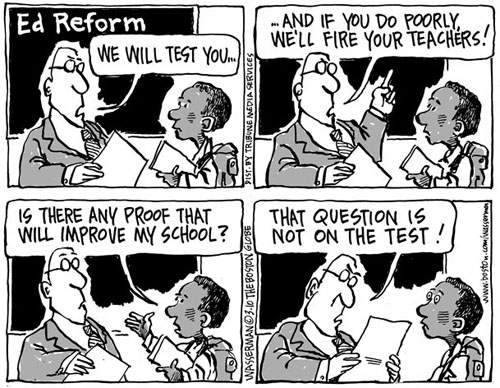Deb Meier and USA Today debate Atlanta test scandals
USA Today and noted educator Deb Meier have had a spirited debate over the testing scandal in Atlanta. It began with the following USA Today editorial, then went on. Although similar debates have been taking place across the country since the Atlanta scandal broke with the publication of the 800-page report of the Georgia investigation a week ago, this is still one of the most succinct among them.
 Author and teacher Deb Meier. THE USA TODAY EDITORIAL
Author and teacher Deb Meier. THE USA TODAY EDITORIAL
Our view: Don't blame tests for school cheating scandals
The wrongdoing was systemic and the coverup sophisticated. Documents were altered, and materials were withheld from investigators. Whistle-blowers were punished, and one of the most blatant perpetrators won plaudits, raises and bonuses.
Another Wall Street scandal? Sadly, no. A year-long state investigation found that nearly 180 educators in Atlanta's public schools had engaged in rampant cheating on standardized tests.
The scandal punctured one of the high-flying success stories of school reform and is all the more unsettling because suspicions of cheating are becoming more common. Baltimore is suffering through its own scandal. A USA TODAY investigation this spring found statistical indications of cheating in Arizona, California, Colorado, Florida, Michigan, Ohio and Washington, D.C.
Perhaps this should not be surprising. Test results affect the pay and job security of both teachers and administrators, so the temptation to cheat is powerful. Too little was done to guard against the risk, a problem that will likely be corrected now that it has been exposed.
 Arne Duncan (in the USA) and Paul Vallas (in Chile) claim that by closing and privatizing the schools with the lowest standardized test scores, education will improve for everyone.The greater danger is that the scandals are being used by teachers' unions and others who have been trying for years to block the accountability tests have finally provided, particularly under the federal No Child Left Behind Act, which requires states to administer annual reading and math tests to students in grades 3-8.
Arne Duncan (in the USA) and Paul Vallas (in Chile) claim that by closing and privatizing the schools with the lowest standardized test scores, education will improve for everyone.The greater danger is that the scandals are being used by teachers' unions and others who have been trying for years to block the accountability tests have finally provided, particularly under the federal No Child Left Behind Act, which requires states to administer annual reading and math tests to students in grades 3-8.
The act is up for reauthorization, and a coalition of groups plans a "Save Our Schools" rally July 30 in Washington to call for an end to using the tests in evaluating students, teachers and schools.
The law, built on state testing initiatives, became necessary because for decades millions of students graduated without being able to read or do basic math. Inept teachers kept their jobs, and failing schools stayed open. The law exposed the severity of the problem, particularly in poorer, minority dominated districts. Now that the test results are finally leading to solutions, more testing will be needed to assure continuing accountability.
Besides, "high stakes" tests have been around for decades — the SAT and ACT to get into college, high school graduation exams, advanced placement exams to determine college credits — but only students faced the consequences.
To be sure, standardized tests shouldn't be the only measure of a student's knowledge or an educator's performance. But given the depth and breadth of the school reform movement they've ignited, it's hard to deny their value.
There are plenty of ways to police them effectively. These include using independent monitors; limiting access to the tests before and after they are administered; and barring teachers from monitoring exams in their own classrooms.
One example among many can be seen at the highly regarded Osmond Church School in Queens, N.Y., where each teacher and student signs an honors pledge before test days. Principal Valarie Lewis brings in substitute teachers so she can deploy co-proctors. She uses "checks and balances" even though the whole atmosphere at her school is a deterrent to cheating.
Students are the ultimate victims of scams to fake higher scores. They are being written off as hopeless by teachers who believe the only way to raise their scores is to cheat. Then they're being lied to about their achievement level. When they graduate without necessary skills, they'll be the ones to suffer.
If the cheaters in Atlanta had put as much time, effort and ingenuity into raising test scores as they did into their schemes, their students might have hit their targets honestly.
[Opinions expressed in USA TODAY's editorials are decided by its Editorial Board, a demographically and ideologically diverse group that is separate from USA TODAY's news staff.
Most editorials are accompanied by an opposing view — a unique USA TODAY feature that allows readers to reach conclusions based on both sides of an argument rather than just the Editorial Board's point of view.]
DEB MEIER RESPONDS TO USA TODAY:
Opposing view: High-stakes tests trigger cheating, By Deborah Meier Posted July 17, 2011
We all can agree that cheating is unethical.
But it's also a fact that cheating is the regrettable but "predictable fallout" from the misuse of high-stakes standardized testing.
That's just common sense. Shopkeepers know that they will lose a little if they keep a stack of newspapers for sale outside the store, but they won't take the same risk with more valuable merchandise. That's because they can predict the results.
The point? Every time we raise the testing stakes, more cheating will result.
While I expect teachers to be more honorable than bankers and hedge-fund operators, I assume they are subject to similar inducements and pressures. Just because teachers are not too big to fail doesn't make them immune from self-interest. Especially as no student suffers from getting a better score than he otherwise might have gotten.
In the "good old days" when I began teaching and
test scores were first being reported by the local press, cheating started to rear its ugly head.
Before that, test publishers told us that any kind of test preparation at all was cheating. At most, teachers would provide kids just 15 to 20 minutes of practice items immediately before the test.
But times have changed and so has testing. Test publishers used to warn against using scores to make important decisions about students and teachers.
But over the past 45 years, testing has become ubiquitous, and scores have had an escalating impact on children — starting in nursery school. Parents with resources even began to take test prepping into their own hands, often hiring expensive tutors.
As a result, the nature of schooling changed, as did our definition of "achievement" and "intelligence." Even jobs that do not require any "academic skills" now use success on standardized tests as a gatekeeper benchmark.
In reality, the system has been cheating rich and poor alike of what constitutes a serious education. But there are better ways — at no greater cost — to make judgments about a student's work and a teacher's effectiveness that are not subject to abuse.
So let's change the inducements and pressures that our testing mania has encouraged, because cheating corrupts us all.
[Deborah Meier is a teacher, principal and author. She won a MacArthur Foundation "genius" award in 1987 and is with the Forum for Education and Democracy.]


By: Karl Wheatley
Atlanta Cheating Scandal
I'm sure the USA Today folks mean well, but they have no idea what is going on in education or how it works, and we must start shouting that from tall buildings and mountaintops.
I don't trust test much, but for those who do, US schools have routinely been #1 in the world or in the top 5 when adjusting for poverty, and not adjusting for poverty is like an astronomer not adjusting for gravity.
Coercion always breeds corruption, especially when targets are impossible or unfair, or when the carrots and sticks are powerful enough. I teach the doctoral course in motivation at Cleveland State University, and carrots-and-sticks are simply an outdated an ineffective paradigm. They have some applications in business for really low-level work and when people have no natural investment in their work, but that is a totally different planet than we educators live in.
USA Today, Please repeat after me:
Our schools were never failing, at least not in the way you think
High-stakes testing makes education worse, not better.
Politicians and CEOs generally don't understand education.
Strong unions are as American as apple pie, there to help protect everyone from bad ideas from on high (such as high-stakes testing). Our problem has been unions and teachers haven't stood strong enough in opposing failed ideas from the past.